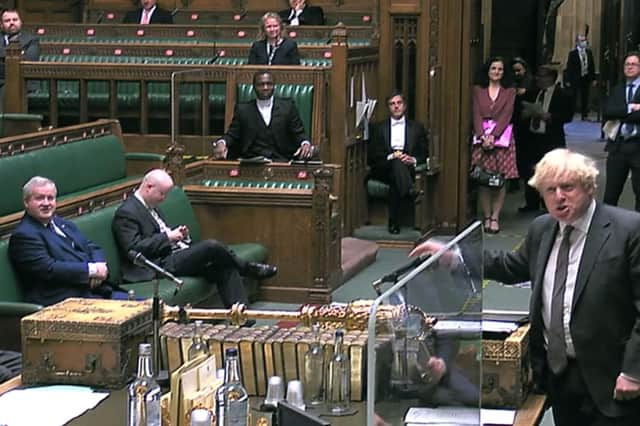Boris Johnson's Brexit deal may wreck an SNP attack line but it also destroys a key plank of unionists' 'Project Fear' – Joyce McMillan


Of the pandemic, and Britain’s handling of it, there will be much to be said, in future months and years; but perhaps, as the year turns, this is a moment best reserved for mourning, and for remembrance of the scores of thousands in the UK – and almost two million worldwide – who lost their lives to the virus in 2020.
On the matter of Brexit, though – well, hardly had the deal been announced, in the gathering dusk of Christmas Eve, when both sides in the Scottish constitutional debate fell upon it like dogs to a bone, each claiming it as the ultimate clincher for their arguments.
Advertisement
Hide AdAdvertisement
Hide AdOn the unionist side, it was hailed as the deal that will rob the SNP of the attack line that says Boris Johnson is nothing but a disaster capitalist, willing to beggar the country so that his mates can make a few bucks on the market; it’s certainly true that some radical internet warriors may now be regretting their more exaggerated predictions on that front. And there’s no doubt that Scotland will share the general relief at the news that we will not face a no-deal Brexit; so much so that the SNP’s immediate condemnation of the deal as “bad for Scotland” will probably be of interest, for now, only to the party faithful.
Growing support for independence
Yet before the parties of Union start to break out the Champagne, they should consider two other factors that remain strongly in play. The first is the inconvenient truth that Boris Johnson’s deal not only destroys the pro-independence argument that he always wanted a no-deal Brexit, but also destroys the unionist argument that Brexit has proved so traumatic and unpleasant that Scotland had better not even think of leaving the UK.
Instead, the Johnson deal virtually guarantees continuing tariff-free trade in goods across the English-Scottish Border, in the event of Scotland becoming independent and rejoining the EU; and also generally softens borders in our region of Europe, in a way that tends to make change easier, while hard borders make it more difficult.
Beyond that, though, there is another deep flaw in the argument of those who would equate Scotland’s departures from the UK with the UK’s departure from the EU; and that is their continuing refusal to recognise the serious political substance of Scotland’s growing reluctance to continue to be governed from Westminster. Seen from London, Scotland’s growing support for independence is often framed as a surge in “nationalist” sentiment, and a rather silly one at that.
What, though, if the truth, as seen from Scotland, is simply that Westminster and the UK’s system of government are becoming increasingly dysfunctional, both psychologically and institutionally; and that growing number of Scottish voters want to leave because they have had enough of that dysfunction, particularly when they can see all around them examples of smaller north European nations – comparable in population to Scotland, and often with fewer natural resources – thriving and flourishing far better than we are.
Xenophobic and delusional
If the Brexit episode has taught us anything, after all, it is that the UK as currently constructed is a country so depleted in the quality of its public debate, so vulnerable to mendacious forms of right-wing propaganda, and so lacking in real constitutional checks and balances, that an evident right-wing scam like Brexit can not only achieve a wafer-thin majority in a referendum still dogged by questions about its legality, but can also be subjected to an extreme interpretation dictated by a far-right faction of the parliamentary Conservative Party – this while the elected governments of Scotland, Wales and Northern Ireland stood by largely unconsulted – and negotiated in a manner so shambolic that it has greatly damaged Britain’s once-high international standing for good governance and diplomatic skill.
It has, in other words, been a historic act of self-harm, unsupported – even today – by a single substantive argument as to what will be improved by it. Yet it is meekly accepted by all mainstream UK political parties; and even worse, it has been driven throughout by a type of passionately nostalgic English-British patriotism – xenophobic, old-fashioned, and often downright delusional – that constantly re-runs the imagery and language of the Second World War, and asserts Britain’s innate superiority to continental Europe, in a way which simply has no resonance for the vast majority of Scots.
Now of course, unrepresented millions in England also share these views. So far, though, south of the Border, there is no electoral majority for a more progressive and less jingoistic type of politics, and an impressive continuing level of support for the Johnson government.
Advertisement
Hide AdAdvertisement
Hide AdUnder these circumstances, and given our own clear majority for a different kind of politics, Scots would need to have a low opinion of themselves indeed not to be considering their constitutional options, perhaps with some urgency. And for unionists, now, the message is therefore a simple one; that defeating the idea of Scottish independence is no longer about buying compliance, flinging cash across the Border, or brushing up the bullying rhetoric for a Project Fear Mark 2. It is about reforming the British state so that it can never commit such an act of folly and corruption again; or accepting that at least in its present form, its time is up.
A message from the Editor:
Thank you for reading this article. We're more reliant on your support than ever as the shift in consumer habits brought about by coronavirus impacts our advertisers.
If you haven't already, please consider supporting our trusted, fact-checked journalism by taking out a digital subscription.
Comments
Want to join the conversation? Please or to comment on this article.
